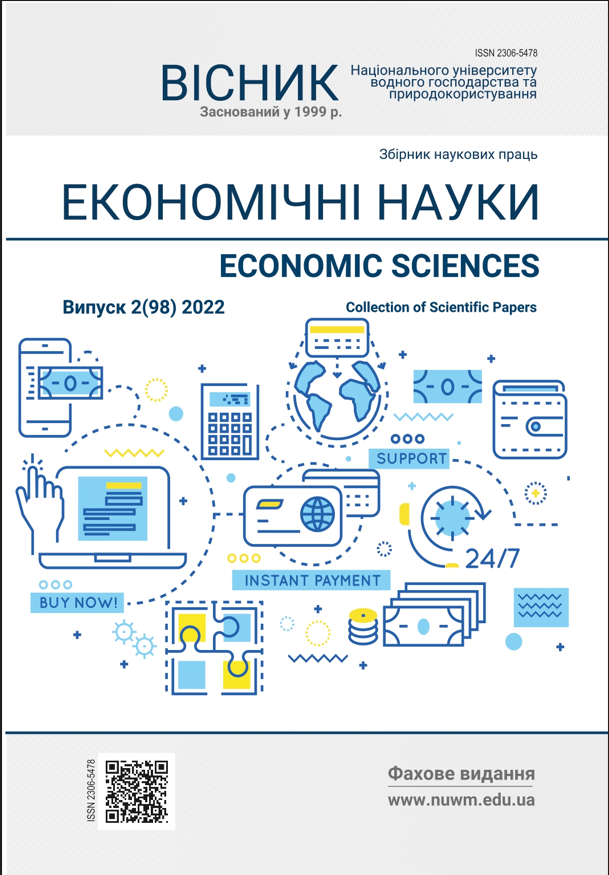EVOLUTION OF KNOWLEDGE FORMATION – A GLOBAL VECTOR OF HUMAN DEVELOPMENT AND ITS CONTRADICTIONS
DOI:
https://doi.org/10.31713/ve2202223Keywords:
knowledge, knowledge economy, intelligence, artificial intelligence, noosphere, intellectual capital.Abstract
The article noted the significant contribution to the development of scientific thought regarding the formation of knowledge by V. Vernadskyi, who predicted the transition of the biosphere into the noosphere, thus pointing to the role of intelligence in the formation of knowledge. It is indicated that he was unable to definitively determine the mechanisms of such a transition due to a number of objective and subjective factors, namely: lack of full understanding of the role of information in the formation of the economy and social sphere, as well as the priority of information and communication technologies and computerization. However, V. Vernadskyі clearly noted the need to change the concept of human perception of nature and the environment. Economically, knowledge shapes the development of the modern economy at the level of countries and regions: the contribution of knowledge to the level of GDP reaches 50%, and the stimulation of economic growth is at the level of 60–70%. Due to the informatization of knowledge, it appears in the modern economic environment as crowdfunding.The main achievement of our research is the discovery of the evolutionary regularity of the dynamics of knowledge formation. If until the 21st century, knowledge was accumulated relatively slowly and in an insufficient amount and exclusively within the scientific research of individual talented researchers, then since the 21st century, knowledge has taken the form of a large-scale nature. Therefore, a separate stage is marked – the economy of knowledge. At the same time, knowledge is formed both in the scientific environment and in production, ie in close mutual integration.The role of intelligence in the formation of knowledge is monitored. It is noted that the initial intelligence originated in the biosphere. In the future, this led to the formation of artificial intelligence. Accordingly, it is indicated that artificial intelligences cause conflict, which manifests itself as a violation of the biosphere. The article raises an extremely complex problem of humanity, which concerns the conflict between human and artificial intelligence. At the same time, artificial intelligence in the process of development forms an artificial information processing system that cannot be evaluated by human reason and logic. The concept of harmonious cooperation of these intelligences, which will lead to the automatic full control of the knowledge of mankind and will determine the implementation of such knowledge, is also noted.References
Young M. The Rise of the Meritocracy 1870–2033: An essay on education and society. London : Thames and Hudson, 1958.
Пархоменко-Куцевіл О. І. Меритократія як основа формування кадрів в системі публічного управління. Державно-управлінські студії. 2018. № 6(8). URL: https://andrijbondarenko.wordpress.com/2012/01/05/merytocracja/ (дата звернення: 01.06.2022).
Richard R. Nelson, Sidney G. Winter. An Evolutionary Theory of Economic Change. 1983. URL: https://www.hup.harvard.edu/catalog.php?isbn=9780674272286 (дата звернення: 01.06.2022).
Romer P. Endogenous technological change. Journal of political Economy. 1990. Vol. 98. Issue 5. Part 2. P. 71–102.
Lucas Jr. R. On the mechanics of economic development. Journal of monetary economics. 1988. Vol. 22. No 1. P. 3–42.
Solow R. A contribution to the theory of economic growth. Quarterly Journal of Economics. 1956. № 70. P. 65–94.
Romer P. Endogenous technological change. Journal of Political Economy. 1990. № 98. S. 71–102.
A. Lee, R. Mudambi, M. CanoKollmann. An analysis of Japan’s connectivity to the global innovation system. Multinational Business Review. 2019. Vol. 24(4). DOI:10.1108/MBR-06-2016-0020.
The Human Capital project. World Bank Group. 2018. URL: https://documents1.worldbank.org/curated/en/363661540826242921/pdf/TheHuman-Capital-Project.pdf (дата звернення: 01.06.2022).
M. Ibarra, F. HernandezPerlines, M. Rodriguez Garcia. Intellectual capital, organizational performance and competitive advantage. European Journal of International Management. 2019. 13(3). Р. 287–311. DOI:10.1504/EJIM.2020.10021761.
National Science Foundation. URL: https://www.nsf.gov/ (дата звернення: 01.06.2022).
J. Kendrick. The formation and stocks of total capital. Columbia University Press, N.Y., 1976.
G. Michalczuk, J. Paszko. Macroeconomic Perspective of Intellectual Capital – National Intellectual Capital (NIC). 2017. DOI:10.15290/ose.2017.05.89.08
G. Schiuma, A. Lerro, D. Carlucci. The Knoware Tree and the Regional Intellectual Capital Index. Journal of Intellectual Capital. 2008. Vol. 9(2). Р. 283–300. DOI:10.1108/14691930810870346.
Bontis N. National intellectual capital index: a United Nations initiative for the Arab region. Journal of Intellectual Capital. 2004. Vol. 5. No. 1. P. 13–39.
Malhotra Y. Knowledge Assets in the Global Economy: Assessment of National Intellectual Capital. Journal of Global Information Management. July–Sep. 2000. Vol. 8(3). P. 5–15.
Найдорожчі бренди 2021: Аpple вперше за чотири роки на першому місці, а Tesla подорожчала на 160%. URL: https://thepage.ua/ua/news/top-500-najdorozhchih-brendiv-2021 (дата звернення: 04.06.2022).

